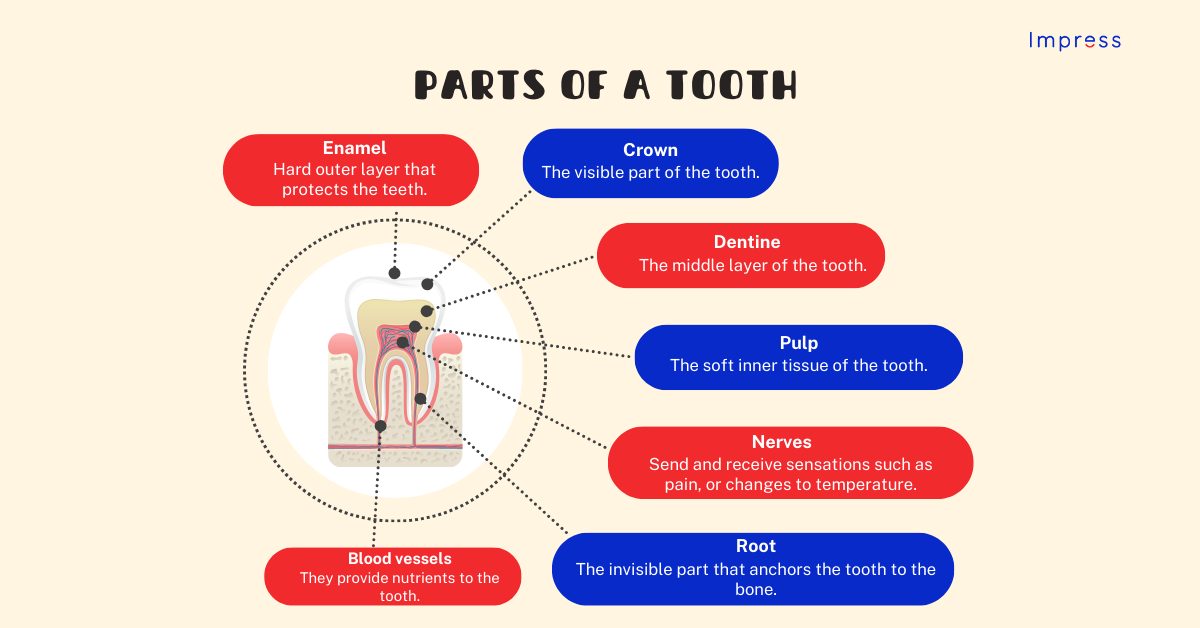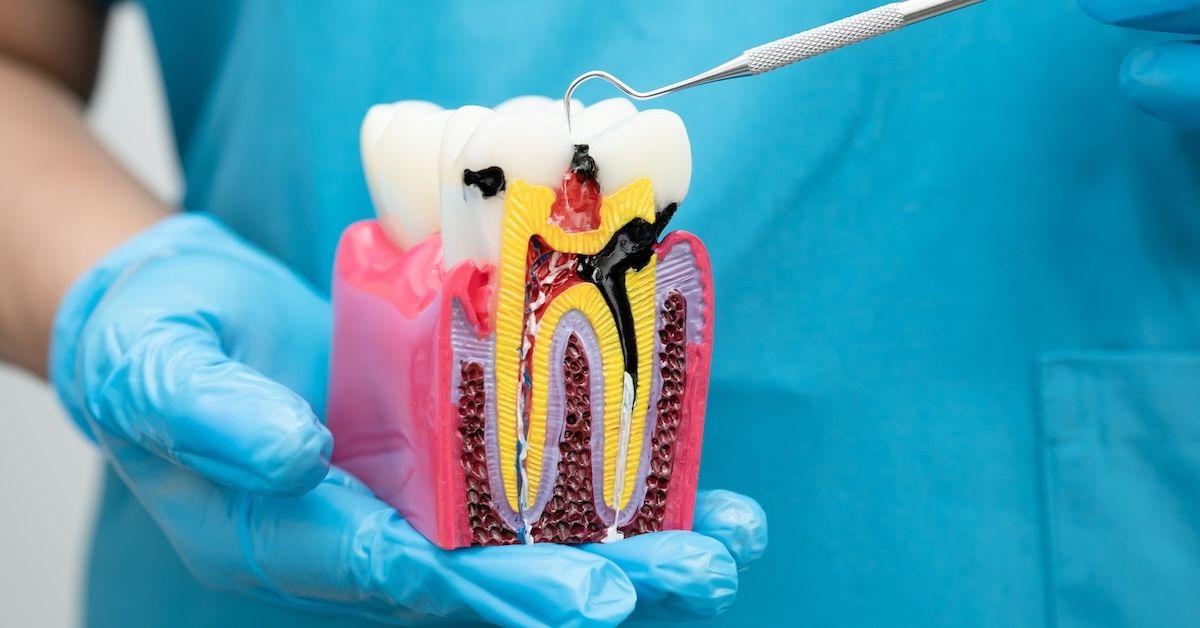Tooth enamel: what it is, causes of erosion and how to strengthen it
Tooth enamel is the hardest part of the human body - even tougher than bones! This is one of the most interesting facts about teeth, but it’s not surprising.
What is tooth enamel?
Enamel covers the outer layer of each tooth and is the most visible part. It can vary from pale yellow to greyish white, but it does not totally determine the colour of the teeth, as it is semi-transparent and can reveal the colour of the dentin underneath.
Tooth enamel is mainly made of minerals, hydroxyapatite in particular. Enamel is not only the hardest substance in our body, but also the most mineralised.
Why is enamel important?
Our tooth enamel is responsible for withstanding the pressure that the jaws exert when grinding food and, at the same time, protecting the dentin from possible damage, which is why its composition is so strong.
However, no matter how resistant it is, it is exposed to acidic foods and beverages that can damage it on a daily basis. That is why it is important to know how to take care of tooth enamel, in order to protect and strengthen it.
In this article, we will explain what tooth enamel is, what it does, the causes of erosion and how you can look after it.
How does tooth enamel help?
Tooth enamel is responsible for protecting the teeth from decay, so it is important to look after it and prevent its erosion. The main function of tooth enamel is to act as a barrier against acids and plaque, protecting the inner layers of the teeth.
It also protects the teeth against very hot or very cold food and drinks. Despite its strengths, however, everyday acids produced by some foods and drinks can weaken it.
Now that we know what tooth enamel is, let's delve into its composition.
What is tooth enamel made of?
The composition of tooth enamel is 96% minerals, 4% organic matter and water. The inorganic part of the structure is made up of crystalline calcium phosphate (hydroxyapatite) and various ions, such as strontium, magnesium, bromine and fluorine.
These ions are what make tooth enamel susceptible to decay because they can be diluted when in contact with acids.
It is not only the composition of the tooth enamel that is important, but also its thickness, which can vary. The maximum thickness can be around 2.5 mm on the surface (e.g. on occlusal surfaces) to a thin margin at the cervical line.
Its thickness affects the colour of the tooth, as the underlying dentine can be seen in thinner areas.
The composition and formation of the tooth enamel structure are significant in understanding its function and overall importance.

What does tooth enamel do?
Knowing what tooth enamel does and its functions is crucial to understanding its relevance to a person’s oral health.
The main function of the enamel is to protect teeth against cavities. It is therefore important to do everything possible to prevent its erosion or loss and to protect it. If your enamel breaks down, you may need to consider dental treatment like composite bonding.
Tooth enamel forms a strong barrier that protects the inner layers of teeth from the effects of acids and plaque. It also protects these more sensitive inner layers from very hot or cold food and drinks.
The function of tooth enamel is, thus, to protect the innermost layers of the tooth, the dentine and pulp, from:
- Tooth decay
- Tooth erosion or loss
- Infections
- Tooth sensitivity (from hot, cold and sugary substances).
Damaged tooth enamel: cracking, loss and erosion
There is a major difference between tooth enamel defects and damage or cracking caused by loss and erosion.
Tooth enamel defects, which manifest as enamel hypoplasia or opacities, are caused by alterations in the development of the enamel organ as a result of inherited or acquired systemic diseases. Cracked or damaged tooth enamel as a result of loss or erosion, on the other hand, is caused by poor oral hygiene.
We will now discuss the various causes of tooth enamel loss or erosion.
Causes of tooth enamel loss or erosion

Tooth enamel erosion refers to the loss of the enamel and is usually caused by exposure to acids. These acids can be produced by bacteria in the mouth, especially when sugars or carbohydrates are metabolised. Wear of the tooth enamel can cause erosion or gradual loss of this outermost protective layer.
The following is a short list of the main causes of tooth enamel loss or erosion:
- Sugary foods, such as ice cream, syrups or sweets.
- Starchy foods, such as white bread.
- Acidic foods, such as apples, citrus fruits, berries and rhubarb.
- Fruity drinks and juices.
- Lemonades, which often contain harmful citric acid and phosphoric acid, as well as sugar.
- Excess vitamin C, which is found in citrus fruits.
- Teeth grinding.
- Chronic acid reflux, also known as gastro-oesophageal reflux disease (GORD).
- Low salivation, also known as dry mouth, which is a symptom of diseases such as diabetes.
- Regular use of certain medications, such as antihistamines and aspirin.
- Eating disorders such as bulimia, which disrupt the digestive system and expose the teeth to stomach acid.
- Genetic disorders such as amelogenesis imperfecta or enamel hypoplasia, which affect tooth development.
Furthermore, as mentioned above, there are several defects (alterations or anomalies in the composition of the tooth enamel) that can cause it to degrade more easily.
This can be due to various reasons, such as genetic factors, malnutrition, dental development problems or environmental factors. All of these factors can cause tooth enamel to become more susceptible to damage or inadequately mineralised.
Symptoms of tooth enamel loss or erosion
As previously mentioned, tooth enamel is translucent: the white colour of the tooth comes from the dentine just below the enamel.
If the tooth enamel becomes worn or damaged, one of the problems it can cause is discolouration of the dentine, leading to discolouration of the tooth.
Other symptoms that can occur as a result of tooth enamel loss or erosion are:
- Chipping, cracking and splitting of teeth.
- Tooth pain and sensitivity.
- Discolouration.
- Transparency or translucency of the enamel, especially at the edges of the front teeth.

How to protect tooth enamel
You can look after your tooth enamel and prevent it from wearing away by avoiding foods that damage it.
Foods to avoid are acidic fruits and drinks, as well as foods high in sugar. When acid or sugar sticks to the teeth and interacts with bacteria in the mouth, it creates lactic acid that can damage tooth enamel.
Avoiding these foods will protect your tooth enamel and, when you do eat them, make sure to brush your teeth thoroughly afterwards.
You can also protect your tooth enamel by practising good oral hygiene. Brushing your teeth regularly with fluoride toothpaste, flossing and having regular professional cleanings at the dentist would all help to look after it.
How to strengthen and improve tooth enamel
If you want to know how to strengthen and improve your tooth enamel, here are three tips on how to do so before it's too late.
- Good oral hygiene
A good oral hygiene routine is always important, even if you don't notice any tooth enamel erosion. However, it is especially important to take extra precautions when you do start to see damage or tooth decay.
- Avoid harmful foods
Acid is the greatest enemy of tooth enamel. Many foods contain high levels of acid that, when combined with bacteria naturally found in the mouth, can have a detrimental effect on tooth enamel.
- Brush your teeth thoroughly, but not firmly
After meals, and at a minimum twice every day, ensure your toothbrush is in good condition and replace it after sickness.
- Visit your dentist regularly
Although most treatments to prevent tooth enamel loss or erosion must be carried out at home, it is still important to visit the dentist regularly.
Regular dental check-ups are necessary even if you are not looking to strengthen or improve your tooth enamel.
Ready for aligners? Visit us and find outTreatments: how to repair and restore tooth enamel
There are several treatments to repair and restore tooth enamel after loss or erosion - some of them can even be carried out at home.
Remineralisation (restoring the loss of minerals from the tooth enamel), for example, can be achieved through fluoride treatments (using a fluoride toothpaste and/or fluoride mouthwash).
Other stronger fluoride treatments (which should always be recommended by a specialist) can also be carried out to help those with weak enamel.
If you are wondering how you can restore or repair tooth enamel in addition to using fluoride, there are other treatments which could help with loss or erosion. Damaged tooth enamel can also be repaired using the following methods:
- Fillings for localised enamel erosion (caries).
- In cases of greater erosion (more extensive caries), if a filling is not possible, crowns are used.
- Dental bonding to protect the surfaces of several teeth.
- Veneers for permanent protection of several or all teeth.
Does tooth enamel grow back?
Essentially, tooth enamel does not rebuild, regenerate or grow back because it does not contain any living cells.
However, as mentioned above, although tooth enamel cannot be restored, it can be remineralised (strengthened) through fluoride treatments. The erosion or loss of tooth enamel is an inevitable part of the ageing process, so only what remains can be preserved.
If significant erosion has occurred and your teeth are in poor condition, dentists can help to maintain or restore your teeth to their former appearance using the following methods:
- Add sealants and adhesives to the enamel.
- Wrapping the teeth with special films called pronamel.
- Removing a broken or dead tooth and inserting an implant in its place.
At Impress we recommend treating existing cavities and improving hygiene and oral healthcare habits to preserve existing enamel naturally.
Look after and protect your teeth with Impress
If you need support with improving your dental health, Impress is here to help. We offer orthodontic treatments, but also procedures such as fillings and cleanings, amongst others, that could help you to improve your oral hygiene. Find out more about all the services we offer at your nearest Impress clinic.
If you are interested in learning more about how Impress can help you improve your oral health, visit your nearest clinic and meet the team of professionals who will supervise your treatment. You can also book an appointment online, by phone on +44 20 3808 1072, or by writing to us on WhatsApp.
Frequently asked questions about tooth enamel
What is the best tooth enamel toothpaste?
The best toothpaste for tooth enamel is one that contains xylitol and has a neutral pH. Xylitol prevents demineralisation by inhibiting the growth of streptococcus bacteria and reducing plaque.
Can tooth enamel loss cause pain?
In the advanced stages of enamel erosion, teeth become extremely sensitive to different temperatures and sugary substances. So yes, tooth enamel loss can cause pain.
What destroys tooth enamel?
In addition to sugary and acidic substances, hard foods such as boiled sweets or ice cubes can also destroy tooth enamel, causing cracks or chips.
What happens if tooth enamel is gone?
When tooth enamel is completely gone, the body can no longer produce a replacement. Unlike other parts of the body, such as bones, tooth enamel does not contain living cells, so cannot regenerate.




